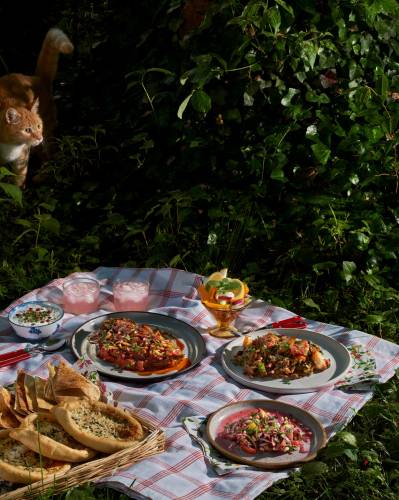The other night, using a delivery platform called WoodSpoon, which offers meals cooked in the homes of neighborhood chefs, I ordered what seemed to be a reasonable amount of Lebanese food for dinner. What arrived was more like catering for a small but festive affair—enough for days—in containers densely packed with lacy, crisp-edged zucchini fritters, layered carefully between sheets of parchment and strewn with arugula, pine nuts, and pomegranate seeds, glistening like jewels; garlicky sautéed dandelion greens, luscious with olive oil and garnished with radishes carved into roses; neatly cut wedges of kibbeh saynieh, a tray-baked loaf of ground beef, cracked wheat, onion, pomegranate syrup, and spices and herbs including cinnamon and marjoram.
I was surprised not only by the generous portions but also by the add-ons and flourishes: cups of sumac, za’atar, and olive oil; fresh pita and lush green salads; whipped baba ghanoush and hummus, dotted with more pomegranate seeds, sprigs of mint, and scallions; a zesty yogurt sauce thick with chopped cucumber. Everything had been prepared by a woman named Raghida Haddad (WoodSpoon profile: Tate’s Kitchen), who was born in Beirut, spent years working for the New York City mayor’s office, and lives in Brooklyn. When I spoke to her later, the reason for the above-and-beyond bounty became clear: she simply couldn’t help herself. “I have witnessed my mom, my grandmother, every woman in my family offering food, so I give so much food!” she told me. “It’s not that I’m not a good businesswoman, it’s just—it’s in my DNA.”

Raghida Haddad, a Brooklyn-based WoodSpoon chef, was born in Beirut and shops for ingredients at Middle Eastern markets on Brooklyn’s Atlantic Avenue.
The crux of some of WoodSpoon’s subway ads is that the company proffers comfort through food without the hassles of human interaction, let alone the obligations of family: “It’s like getting Grandma’s soup, without questions about your love life,” one poster declares. This is a common trope in branding that targets millennial and Gen Z city dwellers, who are often cynically imagined as anxiety-ridden and antisocial. But this undercuts WoodSpoon’s true appeal, as well as the company’s compelling origin story. Pre-pandemic, Oren Saar, a young Israeli immigrant living in New York, was introduced to a fellow-expat who had a side hustle making and selling Israeli food. Saar loved to cook himself but didn’t have time to make certain labor-intensive dishes that he missed from home, such as jachnun, a Yemenite Jewish pastry that’s traditionally baked overnight. After Saar’s wife requested the acquaintance’s jachnun while in labor, a startup was born: a marketplace of culinary side hustles.
What delighted me about WoodSpoon was the sense of connection it gave me, and the curiosity it fulfilled; it really did feel like being invited into my neighbors’ (carefully vetted) kitchens. On a given day, I could order Guyanese curry chicken, dim-sum-style turnip cakes, and Peruvian alfajores. The food was comforting but also stimulating and educational. My order from Haddad came with a handwritten note: “I loved the dishes you chose as they seem to be a culinary bridge between the East & the West.”

Haddad’s baklava.
I got a similar card from Yuhe Su (WoodSpoon profile: Daddy’s Got Chopsticks), whose menu paints a fascinating, deeply personal portrait. Su, a photographer, grew up in Harbin, in northeast China, before moving to New York to attend Parsons. Of his dishes, the hearty, fragrant lamb-and-sour-cabbage soup, featuring long ruffled noodles, tofu, and star anise, is the most representative of his native region, he explains: “When I was living with my grandma, every year, she would use a gigantic jar to pickle as much cabbage as possible, then make this dish all the time until it ran out.”
Su’s desserts include flaky Portuguese-style egg tarts—just like the ones he used to eat in Harbin at Kentucky Fried Chicken, which bought a recipe for them from a famous bakery in Macau in 1999, the year in which rule of that city was transferred from Portugal to China. “Oh I miss KFC in China so much!!” Su’s description reads. His homesickness is our gain. (Entrées around $10-$22.) ♦
Sourse: newyorker.com






